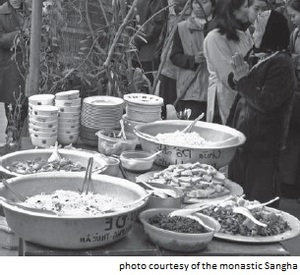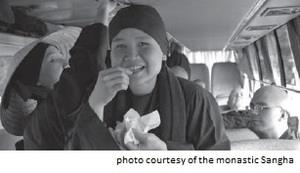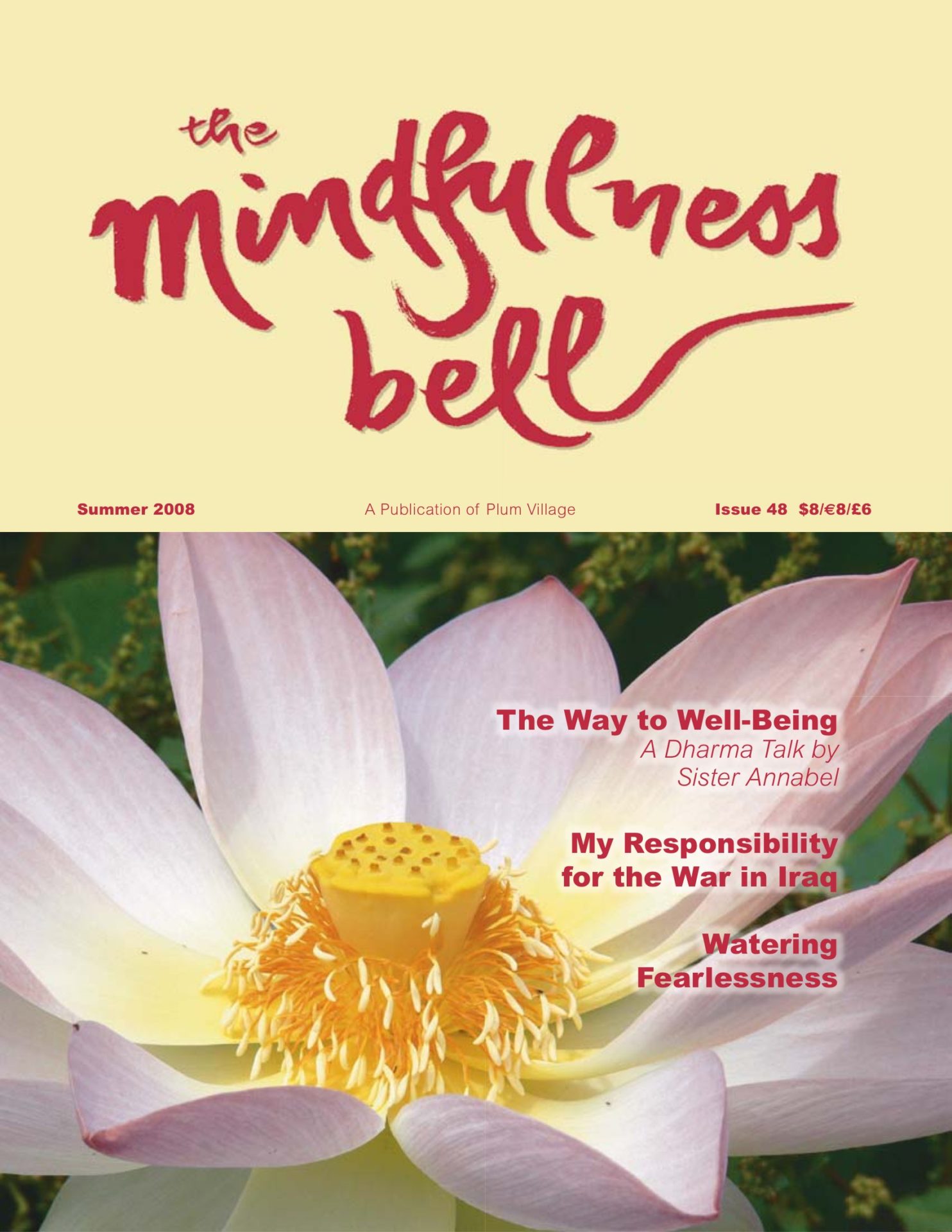
In each issue of the Mindfulness Bell readers take on a different topic, writing in short essays about their personal experience and their practice.
We have covered the Five Mindfulness Trainings; now we ask for your thoughts on the role that art plays in your practice and your life. Keep it concrete, personal, and short — under 500 words. Send your submission to editor@mindfulnessbell.org by July 15,

In each issue of the Mindfulness Bell readers take on a different topic, writing in short essays about their personal experience and their practice.
We have covered the Five Mindfulness Trainings; now we ask for your thoughts on the role that art plays in your practice and your life. Keep it concrete, personal, and short — under 500 words. Send your submission to editor@mindfulnessbell.org by July 15, 2008 (or so). The next topic, due October 15, 2008, will be the role of music in your practice and your life.
The Fifth Mindfulness Training
Aware of the suffering caused by unmindful consumption, I am committed to cultivating good health, both physical and mental, for myself, my family and my society by practicing mindful eating, drinking and consuming. I will ingest only items that preserve peace, well-being and joy in my body, in my consciousness and in the collective body and consciousness of my family and society. I am determined not to use alcohol or any other intoxicant or to ingest foods or other items that contain toxins, such as certain TV programs, magazines, books, films and conversations. I am aware that to damage my body or my consciousness with these poisons is to betray my ancestors, my parents, my society and future generations. I will work to transform violence, fear, anger and confusion in myself and in society by practicing a diet for myself and for society. I understand that a proper diet is crucial for self-transformation and for the transformation of society.

Two years after I discovered Thay and his teachings, I decided to stop drinking alcohol. There were many reasons. I had just spent six months in India without drinking any alcohol and I was inspired to continue this practice. I had also witnessed the terrible effects of alcohol addiction on someone very dear to me. And I was deeply inspired by Thay’s teaching — it is better to be mindful of what is going on inside of ourselves rather than losing ourselves in a glass of wine.
At first, when socializing with friends, I had a lot of explaining to do. Apparently, not drinking is more unusual than being a vegetarian. The most difficult part was, by far, how to explain my decision to my friends without making them feel that I was, in some way, judging them. After they recognized my preferences, even if they didn’t completely understand, many of them made a special effort to serve lovely soft drinks or juices, instead of a bottle of wine.
Meanwhile, alcohol completely faded away from my system and my thoughts. I bypassed the alcoholic beverages in the supermarket and enjoyed a variety of soft drinks. I never really drank much, but by quitting completely I became more aware of how I had used alcohol; it was the way that I coped with stress in my life. After work, just one glass of wine would induce a warm, relaxed feeling that allowed me to let go of everything. “So, what’s wrong with that?” I used to say to myself, especially if one glass of wine would do the trick. However, the wine smoothly masked a problem without contributing anything to a solution. Why did I let myself get so stressed out by things that were happening at work?
Going completely “tee-total” also helped me recognize the role that alcohol is playing in our society. I discovered how socially unacceptable it is to not drink. There is a stigma attached to it and an assumption made that the only people who completely quit drinking alcoholic beverages are alcoholics!
After six years of not drinking alcohol, I gradually became less strict with my practice. On occasion, when I socialized with friends or colleagues, I would have a glass of wine or beer. I enjoyed the taste and the sense of gezelligheid (cozy togetherness), something that is very important to us in The Netherlands. But this also meant that alcohol started creeping back into my life. In the supermarket, I began once again to look at the wine. Or when cycling home from work, I felt a craving for a glass of instant relaxation. I resisted but realized that for many years there had been nothing for me to resist — because when I was not drinking alcohol the cravings were gone. I guess that is one of the considerable benefits of quitting completely — you just don’t have to think about it. Ever!
So, I have chosen to quit again, but this time with a deeper understanding of the reasons why. Reasons that will give me the confidence to believe that I will avoid the fate of the famous smoker who said “giving up is easy, I’ve done it lots of times.”
Evelyn van de Veen Shining Strength of the Heart Amsterdam, The Netherlands

I have suffered a lot from what I have ingested in the past. Growing up, my family was very unhappy, and we weren’t able to be close and supportive. As a result, all of us developed addictions to eating and TV, among other unhealthy habits. Joining the sangha and hearing this training, I knew I had to change the fundamental way I was relating to myself. I no longer wanted to neglect my body and be terrorized by my disturbing thoughts and feelings. I had taken refuge in eating, intellectual snobbery, unwholesome creative expression and a judgmental attitude; now I wanted to let go of these. But how could I make such a massive change?
This training brings me in touch with the many elements I am made of. Cultivating awareness, I can choose what elements to allow in me to become the future me. I accept that I am vulnerable, affected by everything in my environment, and also that I am powerful, able to direct my future by knowing what environments will allow me to grow healthy and which not. When I identify suffering, I can examine what I have been consuming — eating, paying attention to, thinking about, saying, or participating in. By doing this I have the confidence that I have taken a good step toward well-being.
Now when I eat, I think, do I want to eat this food because my body wants the nourishment, or because I feel agitated and want to ignore the agitation? If it is that my body wants to be nourished by the food, I am being compassionate and loving to myself by eating it. If it is that I feel agitated, I need to give myself compassion, to take care of myself by returning to my breath and calming my agitation.
When I buy things, bringing awareness I can ask, do these bring the joy I’m after? I invite my motivations to reveal themselves, and also my needs. And then I ask, what does bring me joy and peace? This way I can know my real self, and pay attention to all the wonderful things around me that do bring me joy, solidity, clarity. I need to be compassionate and use these opportunities to nourish myself now so I will be strong in the future.
This training leads me to the refuge of the sangha, to the wholesome environment that it provides. In the sangha I consume stability, sanity, love. I participate joyfully in the stream of life horizontally in my peers by allowing my heart to open. Being present I nourish them and am nourished by them, and my life has meaning. From this training I recognize that my practice is food for myself and everyone I meet. I practice this training for my family in order to love them better, for my ancestors whose environments filled them with disparagement and craving, and so lost them the opportunity to develop the capacity to love and be loved.
Scott Morris
Realizing Vision of the Heart
Toronto, Ontario, Canada

In my studies I learned that insight was one of the doors to liberation and that non-self, impermanence, and non-suffering were the keys to insight. These were interesting ideas, but I couldn’t really find out how to practice them. It turned out that my practice with alcohol gave me my first glimpse into non-self.
When I first practiced the Fifth Mindfulness Training, it was often a forced affair, almost a physical effort to refrain from drinking. Sometimes this technique didn’t work and I ended up drinking anyway. In these cases I often tried to bring mindfulness to my drinking, taking notice of how it made me feel. I brought awareness to the reasons I wanted to drink and I discovered the desire to connect more deeply with others, to escape from negative emotions, and to feel more confident. Sometimes taking notice of these desires caused my beer to remain unfinished.
Over time, I saw how my life was improving due to reduced alcohol consumption. Still I occasionally felt like I was missing out on the fun. Other times it was the opposite, a feeling of guilt for drinking and going against my vow. And other times I got on my high horse and told my friends how bad they were for drinking.
Mindfulness made it easier and easier not to drink. I started to feel more free. Then something changed — I noticed how my drinking would encourage my friends to drink. It’s easier to drink when others are doing it. I saw that by buying a beer, I was paying for alcohol advertisements. I was partly responsible for the alcohol problem we have in our society. My point of view had shifted — it wasn’t just about me anymore. When I saw this for the first time, and understood it in my heart, then in that moment all desire to drink was removed. There was no guilty feeling, no sense of missing out, no wanting to escape. Replacing the desire was a feeling of love and care for my friends. I realized I could connect with them in a way that was true without needing alcohol. I could be with them without judging them for their drinking. I felt so free. I felt that for the first time in my life, my intentions were finally in line with my aspirations.
The insight of non-self and the mind of love are there with their clear voice: it’s not just about me.
Paul Baranowski
Solid Awakening of the Heart
Toronto, Ontario, Canada

